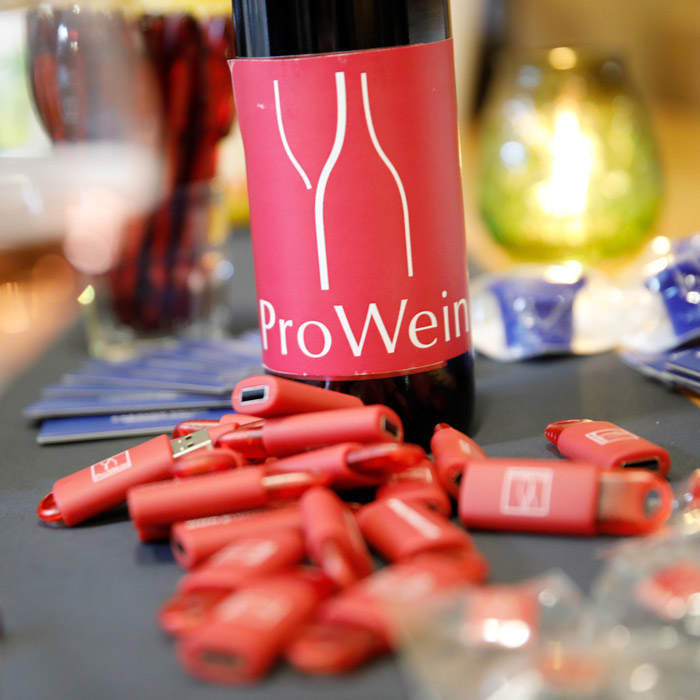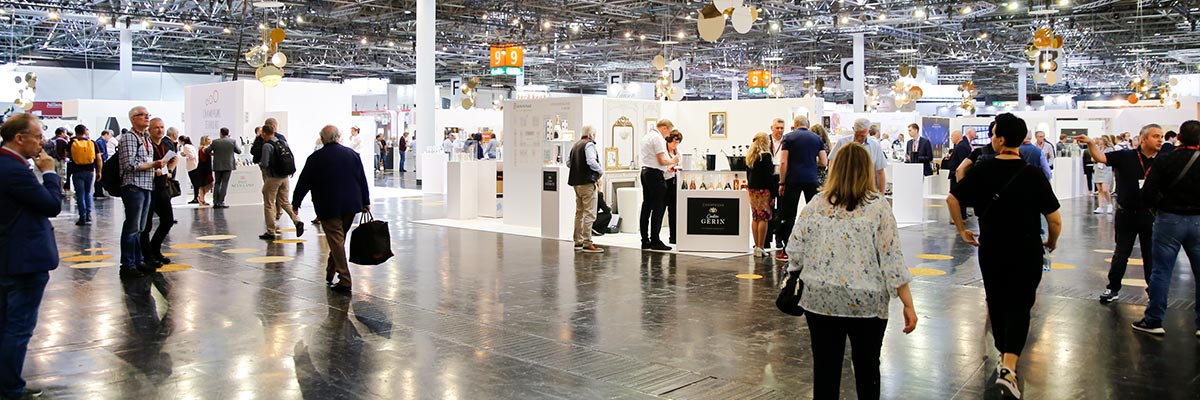
With around 5,500 exhibitors from 60 countries for the product groups wine, spirits and craft drinks, ProWein in Düsseldorf was once again the world's biggest trade fair for industry professionals this year. However, this represents a drop of almost 20 per cent compared to 6,900 exhibitors in 2019. Although three more halls were used than usual for health reasons, the exhibition area was around 4,000 sqm less than in 2019. The managers of many businesses did not even make the trip: for example, the Association of German Prädikat Wine Estates (VDP) was represented by only 78 wineries this time. In 2020, 129 VDP wineries had registered to come to the later postponed fair.
According to figures from Messe Düsseldorf, only about 38,000 visitors came, which is more than 35 per cent less than in 2019, when 61,500 were counted. Many experts had expected this, as many visitors from China, the USA and Russia were absent this time due to health or political restrictions. The significant decline caused long faces among many exhibitors because their expectations were not met. While the Deutschlandhalle was still fairly busy, in other halls you often only saw vintners tasting wines from their colleagues next door. This depressed the mood among the exhibitors.
But the organisers also see the fair as a stage for current trends: they set priorities for four major themes that have emerged in the years of the pandemic-related lockdowns: Non-alcoholic as well as -reduced drinks, sustainability, rosé as well as the steadily increasing importance of wine tourism.
In the first quarter of 2022, German households bought 18 per cent less wine than in the same period in 2021, which, however, produced exceptional sales figures due to the Covid 19 pandemic and restrictions in the restaurant trade. Wine sales are thus at the level of the first quarter of 2020. The managing director of the German Wine Institute (DWI), Monika Reule, fears a further decline due to the sharply rising cost of living. "As long as the tense economic situation does not improve, it is to be feared that this development will continue."
In addition, extreme price increases for bottles, cartons, labels, energy and transport are burdening producers and bottlers. These price increases have to be passed on to consumers, at least to a large extent. Those who are still being supplied at all can count themselves lucky. Many wineries all over Europe cannot bottle their wines because they cannot get the necessary material even for more money.
 |
The range of non-alcoholic wines and spirits is currently growing. Younger consumers in particular like to reach for these alternatives. According to an analysis by IWSR, market researchers specialising in industry data, this market grew by almost a quarter from 2018 to 2021, from 7.8 billion dollars to 10 billion dollars. In addition, there were various presentations and tastings. The trend show "Same but different" in Hall 7.0 was dedicated to the keywords "Mindful Drinking" and "Sober Curiosity". The suppliers of non-alcoholic wines and spirits at ProWein came from Australia, Belgium, Germany, France, Italy, Canada and the Netherlands. Besides wines and sparkling wines, they even presented whisky, gin and aperitifs without alcohol.
The buzzword "sustainable" is currently being used almost inflationarily in the wine scene. Especially in the wine industry, changes that seriously address aspects of sustainability are playing an increasingly important role. After all, this is about preserving a cultural asset for future generations. Climate change is forcing wine producers to adapt vineyards, their cultivation methods and ultimately even wine styles.
To this end, the Fair and Green association presented the book "Holistic Sustainability in the Wine Industry - Sustainable Solutions for the Entire Value Chain", which provides an overview of the current status of implementing sustainability in viticulture as well as an outlook. The contributions of experts from practice, science, research and consulting provide an insight into the topics and aspects of sustainability. They shed light on the economic, ecological and social aspects of sustainability.
In addition, several events dealt with sustainable solutions for production, packaging and transport.
The German Wine Institute (DWI) dedicated its stand to the global trend towards rosé. DWI Managing Director Monika Reule still sees great potential for German rosé wines: "Germany is the fifth largest rosé producer worldwide and contributes four per cent to the global rosé wine market".
Germany's 20 best rosés, selected by an international jury from the most important export countries, were offered for tasting. Rosé sparkling wines were also presented in detail in a commented tasting on each day of the fair.
The jurors of the competition emphasised that German rosé wines and sparkling wines had experienced an enormous quality boost in recent years and did not have to shy away from international competition.
The trend towards regional tourism has also given wine tourism a boost. It has become an important sales and image channel for winegrowers. In addition, camping and caravanning have become extremely popular in the pandemic years. Many wineries already offer motorhome pitches. ProWein has therefore been cooperating with the Düsseldorf "Caravan Salon" trade fair for some time and presented the latest news in this sector, which still promises many synergies, in a special show.
ProWein also picked up on the success of champagne with turnover and sales increases of over 30 percent in 2021 alone. 120 champagne producers poured at ProWein, many of them in the Champagne Lounge. Organic wineries and associations from Italy, France, Germany, Spain and Greece as well as Demeter vintners showed their current wines in Hall 5.
© Photos: Messe Düsseldorf, Constanze Tillmann